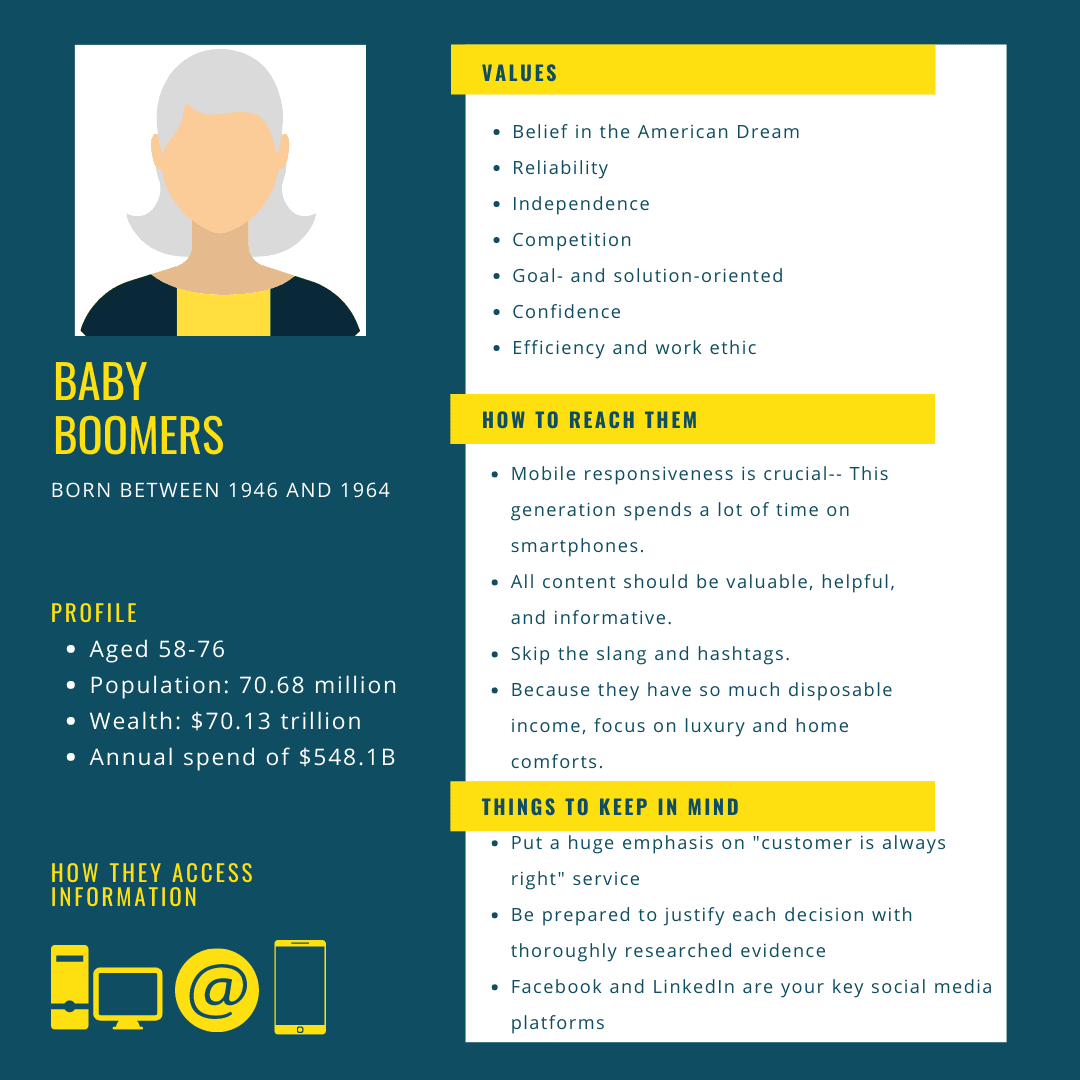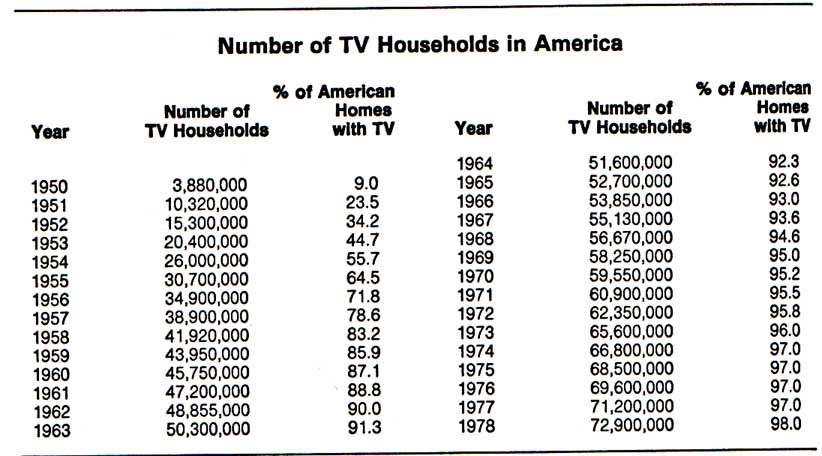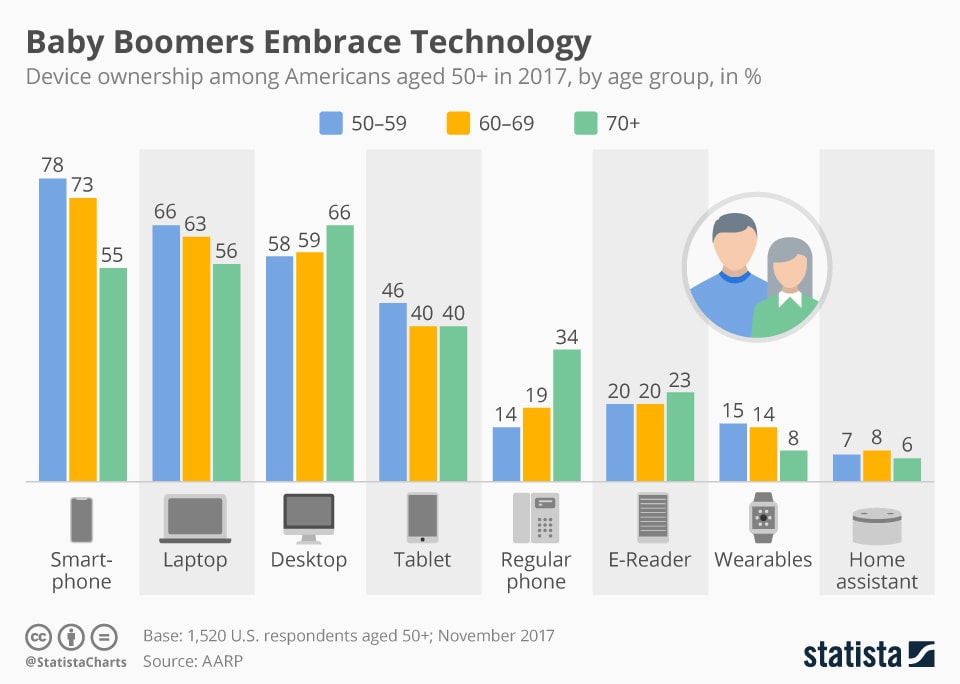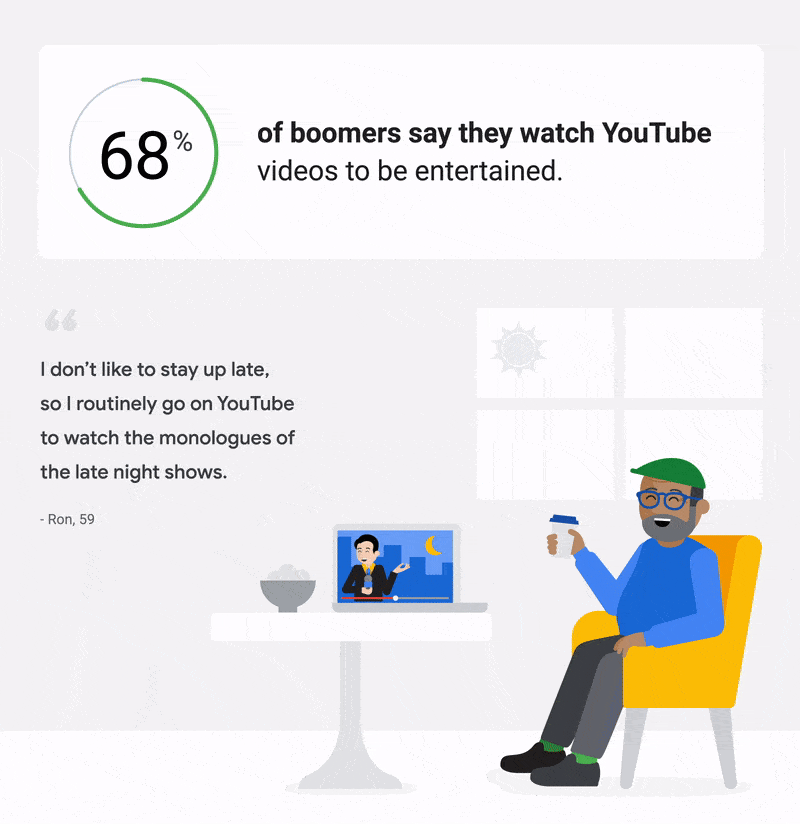Baby Boomer Marketing: Insights and Tips

The second-largest generation consists of Baby Boomers or people born in the post-WWII era. They are marked by a more traditional worldview, dominated by the “pull yourself up by your bootstraps” mentality that facilitated their success in the dawn of the digital age.
More so than the generation that came before them, Baby Boomers are tech-savvy, informed shoppers with a lot of disposable income they’re willing to spend on making their retirement years as comfortable as possible.
What is a Baby Boomer?

Marketing to Baby Boomers can show significant returns for businesses that take the time to do it correctly. Give yourself a competitive advantage by understanding the generation more affluent than any other generation that came before or after.
Data Rundown
- Born between 1946 and 1964
- Ages range from 58 to 76
- Population: 70.68 million
- Wealth: $70.13 trillion
- Annual spend of $548.1B
Baby boomers were born between 1946 and 1964, putting them between 58 and 76 in 2021. They came of age during an economic boom following World War II. They experienced considerable shifts in social, technological, and medical advances as they came of age.
Events That Define the Generation
Baby boomers were called “Me Decade” by writer Tom Wolfe in the 1980s because of the push toward self-fulfillment when Baby Boomers were young. In the 1960s and the 1970s, the culture of adolescence and young adulthood took a dramatic change.

Those years were characterized by the Civil Rights movement, the women’s movement, hippie culture, protests against the Vietnam War, and the prominence of music as a political statement.
Furthering their involvement, in-home television ownership skyrocketed. In 1950, only 9% of homes had TV sets. By 1963, that number hit a massive 91.3%.

Growing up amongst the turmoil, geopolitical revolution, and countercultural movements, Baby Boomers developed a mile-wild independent streak and tendency to seek self-fulfillment that is still quite obvious in those in their early-mid sixties to mid-seventies.
They are hard workers with high standards for exceptional customer service, cost value, and brands maintaining trust with their consumers.
The Relationship between Baby Boomers, Technology, and Online Shopping
Baby boomers were amongst the first adults to get familiar with home computing. Despite the misconception that they are not particularly technologically inclined, the reality is that they are pretty friendly when it comes to smartphones, home computers, and tablets. That number begins to waver, though, with wearables and home assistants, like Google Home and Amazon Alexa.
Still, that leaves a wide berth for those in the marketing world to get their foot in the door when targeting Baby Boomers.
As previously mentioned, the “Me Generation” is more interested in getting the most bang for their bucks, seeking products and services that will add adventure to their golden years. Unlike Millennials, they are less interested in brands’ moral and ethical persona.
Instead, they want small businesses to impress them with results that speak louder than any email campaigns, social media marketing, or PPC advertising strategy can.
They expect brands to stand behind their claims and are more than willing to search online for product information before spending their hard-earned cash. That puts a lot of pressure on businesses that want to effectively market and grow sales with Baby Boomers who shop online.
How the Baby Boomer Generation Spends Time Online
It might come as a shock to those who believe that it’s only worth having a digital marketing strategy for the younger generations, but 51% of Baby Boomers spend 15+ hours a week online, compared to 41% of Millennials.
They Use Social Media to Connect with Family and Friends
In an interview with Forbes regarding the results of a study conducted by Security.org, Corie Colliton, who oversaw the research, outlined the key differences between social media usage in Baby Boomers compared to other generations.
“Millennials generally spend more time on social media, and there are diminishing returns to that time spent. Millennials also tend to use social media as an ‘aspirational’ or personal branding tool, either by posting exciting updates or following accounts of people they admire – which can have the opposite of the intended effect and leads to the ‘FOMO’ feeling… Baby Boomers tend to use social media for interpersonal reasons like reconnecting with friends, getting family updates, etc. and have more positive emotions associated with the experience as a result.”
In terms of overall presence, YouTube is the most popular “social media platform,” with 70% of this generation saying they use it regularly. Baby Boomers often engage with the video content socially by sharing with friends, adding comments, and reposting.
Other social media sites are less popular:
- 68% use Facebook
- 27% use Pinterest
- 24% use LinkedIn
- 23% use Instagram
- 17% use Twitter
- 9% use Snapchat
How It Affects Marketing Your Business
While positive sentiments about social media may seem optimistic at face value, marketers should consider that Baby Boomers see advertising as intrusive, not engaging.
Millennials and Gen Z expect to see this type of content. The Me Generation wants their Facebook experience to center around connection instead of commerce.
The only exception to this general rule is video content and related blog content that centers around non-sales topics. Marketers will see better results by giving their Boomer-centric target audiences posts that skip the salesman act and give them more insights and information about their interests.
Baby Boomers Embrace a Range of Devices
The vast majority of Baby Boomers, especially those aged 50-59, are very well connected online. Their vast disposable income allows them to invest in the latest gadgets, which they do with gusto!
As illustrated in the Statista infographic, 78% of this age group own a smartphone, 66% own a laptop, 58% own a desktop, and 46% own a tablet.

One thing to keep in mind: depending on your specific Baby Boomer target market, you should adjust whether your focus is on desktop optimization or smartphone optimization.
In the 70+ age range, Baby Boomers prefer desktop computers over any other device. Don’t drop the ball on your mobile marketing efforts, though. The majority (55%) still own smartphones, and they pretty much align with the younger segment in tablet ownership (40%).
How It Affects Marketing Your Business
Because mobile devices and smartphones are the most popular technology in 2/3 of this age group, ensure that your website pages are mobile responsive. Slow-loading content leads to high bounce rates, which means that Boomers spend less time learning about your business.
Video Dominates Their Leisure Time
Despite being an older generation, Baby Boomers align more with the younger generation segment when watching videos online. A Google survey found that 68% of Baby Boomers are an incredibly active audience on YouTube for sheer entertainment value, favoring it over cable TV for its convenience and engaging content.

Additionally, 33% of Baby Boomers turn to YouTube to learn more about a specific product or service. This is good news for businesses looking for new ways to reach this target audience–Share how-tos and informational videos across social media platforms to encourage online purchases.
How It Affects Marketing Your Business
Put out valuable videos on your YouTube page. Boomers prefer the platform over visiting news sites and turn to it for information before purchasing online. A high-quality multimedia strategy is crucial for business growth with this group more than any other generation. Prioritize it over Facebook advertising, and cross-post your latest uploads to spark higher engagement rates.
More Disposable Income That Younger Generations Means High Rates of E-Commerce
Baby Boomers are the reigning kings of online purchases from groceries to travel packages. In 2020 alone, their online spending increased a massive 49%, and it’s showing no signs of slowing down.
In an interview with Washington Post, Deborah Weinswig, CEO of retail consulting firm Coresignt Research, attributes the Baby Boomer generation’s sudden interest in buying online to increased accessibility and the opportunity for more choice in their purchasing decisions:
“There has been a significant increase in consumers over 50 who had never shopped online and are now saying, ‘Oh wow, this is so much easier than I thought. There’s going to be a lot more mixing and matching: ‘Maybe I want to go to the store to squeeze my own vegetables, but I’ll get non-perishables and dry goods delivered.'”
How It Affects Marketing Your Business
Search engine optimization should top your priority list if you want marketing to Baby Boomers to succeed. They’re the generation most likely to look into many brands before settling on one they want to do business with.
Pour time and research into targeting keywords that focus on value more than other factors, as 64% of the Boomer population use search engines to compare product prices during their decision-making process.
Wrap Up: 5 Simple Steps to Effective Baby Boomer Marketing
Because they are both progressive and traditional, marketers face challenges reaching Baby Boomers. To wrap up, we wanted to leave you with five steps you start working on today to reach this generation more effectively:
- Leave behind the notion that Baby Boomers don’t use the internet. They are keen customers and worth marketing to.
- Instead of creating Facebook content, focus on search engines and keywords. Baby Boomers spend a lot of time researching products and business options before they are willing to buy but find blatant social media advertising intrusive.
- Results speak volumes in terms of brand loyalty. When marketing to Baby Boomers, never make a promise that you can’t keep. This generation will hold your business to their word.
- Baby Boomers want to speak to a real person. Live chats, whether through Facebook messenger or your website, can help ensure they are satisfied with your customer service.
- Work with a marketing firm. Baby Boomers are an affluent generational marketing target audience, but your strategy has to be done well. Otherwise, you risk alienating the people with the most money to spend on internet shopping.